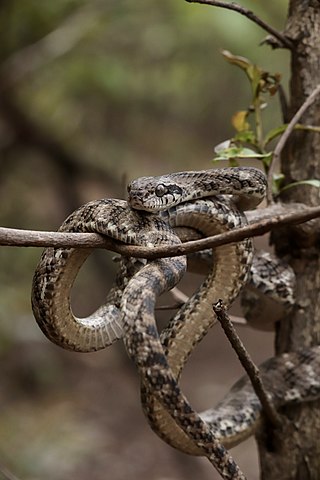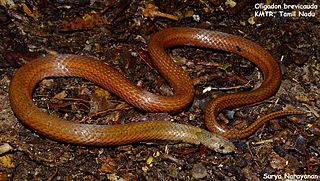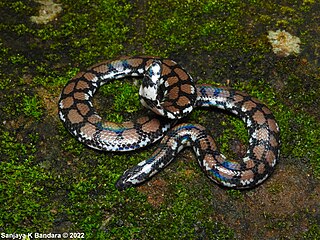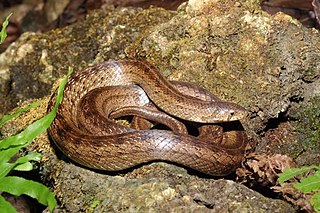
Boiga is a large genus of rear-fanged, mildly venomous snakes, known commonly as cat-eyed snakes or simply cat snakes, in the family Colubridae. Species of the genus Boiga are native to southeast Asia, India, and Australia, but due to their extremely hardy nature and adaptability, have spread to many other suitable habitats around the world. There are 38 recognized species in the genus. According to the study done by Jiří Smíd regarding Old World cat snakes, the ancestor of the cat snake originated in Africa, from where it diversified and expanded to other countries. Despite this diversity however, the different species have very similar needs in terms of temperature and precipitation.

Oligodon is genus of colubrid snakes that was first described by Austrian zoologist Leopold Fitzinger in 1826. This genus is widespread throughout central and tropical Asia. The snakes of this genus are commonly known as kukri snakes.

Boiga ceylonensis is a species of rear-fanged, mildly venomous, nocturnal, arboreal colubrid snake endemic to Sri Lanka.

Boiga forsteni, also known commonly as Forsten's cat snake, is a species of mildly venomous rear-fanged snake in the family Colubridae. The species is endemic to South Asia.

The banded kukri snake, russet kukri snake, or common kukri snake,, is a species of nonvenomous colubrid found mainly in South Asia.

The streaked kukri snake is a species of nonvenomous snake found in Asia. It is also known as the variegated kukri. The IUCN lists the species as least concern.

Oligodon cinereus, the ashy kukri snake or Günther's kukri snake, is a species of snake in the family Colubridae.

Oligodon brevicauda, the shorthead kukri snake, is a species of snake found in the Western Ghats of India.

Sibynophis subpunctatus, commonly known as Duméril's black-headed snake or Jerdon's many-toothed snake, is a species of nonvenomous colubrid snake endemic to Bangladesh, India, Sri Lanka, and Nepal.

The Ceylonese cylinder snake is a species of snake in the family Cylindrophiidae endemic to Sri Lanka. It is known from plains up to 1000m, localities include Gampola, Peradeniya, Kandy, Pallekele, and Elahera in the central hills and Nikaweratiya in the north-western part of the island.
Aspidura copei, commonly known as Cope's rough-sided snake or කලු මැඩිල්ලා in Sinhalese, is a species of snake in the family Colubridae. The species is endemic to Sri Lanka.
Aspidura deraniyagalae, commonly known as Deraniyagala's rough-sided snake, the Sri Lanka rough-sided snake, and කදු මැඩිල්ලා in Sinhala, is a colubrid species endemic to Sri Lanka.

Aspidura trachyprocta, the common rough-sided snake, known as දලව මැඩිල්ලා in Sinhala, is a colubrid species endemic to Sri Lanka.
Oligodon calamarius is a species of nonvenomous colubrid endemic to Sri Lanka. It is known as කබර දත්-කැටියා in Sinhala.
Oligodon annamensis, commonly known as the Annam kukri snake or Leviton’s kukri snake, is a species of colubrid snake originally known from two specimens from Vietnam, where it was thought to be endemic. It has also since been found in Cambodia and Thailand.
Oligodon annulifer, also known as the ringed kukri snake, is a colubrid snake endemic to the island of Borneo.

Oligodon formosanus, also knowwn as the Formosa kukri snake or beautiful kukri snake, is a species of snake in the family Colubridae.

Oligodon huahin, the Hua Hin kukri snake, is a species of kukri snakes in the genus Oligodon. The species was first discovered and described in late 2016, and the article was published July 13, 2017. It is only known from its type locality but its range is likely to be more extensive. O. huahin is thought to be very secretive, similar to other species of the genus Oligodon. This theory is supported by the type specimen, which all were males, suggesting that it was found during the mating season where males are out and actively search for females to reproduce. This may also explain why this species had not yet been discovered

Oligodon russelius, commonly known as Russell's kukri snake is a species of snake in the family Colubridae. The species is very closely related to Oligodon arnensis, from which it has been recently separated. The specific epithet honours the British herpetologist Patrick Russell, one of whose illustrations possibly depicts this species.
















